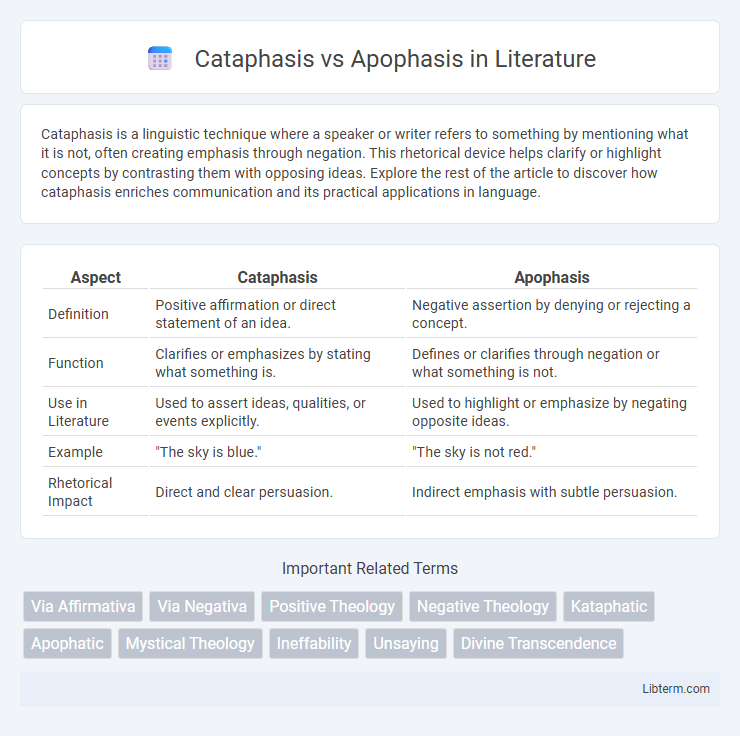Cataphasis is a linguistic technique where a speaker or writer refers to something by mentioning what it is not, often creating emphasis through negation. This rhetorical device helps clarify or highlight concepts by contrasting them with opposing ideas. Explore the rest of the article to discover how cataphasis enriches communication and its practical applications in language.
Table of Comparison
| Aspect | Cataphasis | Apophasis |
|---|---|---|
| Definition | Positive affirmation or direct statement of an idea. | Negative assertion by denying or rejecting a concept. |
| Function | Clarifies or emphasizes by stating what something is. | Defines or clarifies through negation or what something is not. |
| Use in Literature | Used to assert ideas, qualities, or events explicitly. | Used to highlight or emphasize by negating opposite ideas. |
| Example | "The sky is blue." | "The sky is not red." |
| Rhetorical Impact | Direct and clear persuasion. | Indirect emphasis with subtle persuasion. |
Understanding Cataphasis and Apophasis
Cataphasis involves explicitly affirming a statement or idea to emphasize its importance, often used to highlight a positive attribute or fact. Apophasis, by contrast, asserts something by stating that it will not be mentioned, thereby drawing attention indirectly. Understanding cataphasis and apophasis is crucial in rhetoric for effectively controlling emphasis and shaping audience perception through either direct affirmation or strategic omission.
Etymology and Origins of the Terms
Cataphasis derives from the Greek word "kataphasis," meaning "affirmation" or "statement," rooted in "kata-" implying "down" or "thoroughly," and "phasis," meaning "speech" or "utterance." Apophasis comes from the Greek "apophasis," signifying "denial" or "negation," composed of "apo-" meaning "away from" or "off," and "phasis," related to speaking or expression. Both terms originated in classical rhetoric, contrasting direct affirmation (cataphasis) with negation or indirect mention (apophasis) in discourse.
Philosophical Foundations of Cataphasis
Cataphasis in philosophy emphasizes positive affirmations of being and existence, affirming attributes and qualities as true descriptions of reality. Rooted in Aristotelian and Thomistic metaphysics, cataphatic theology asserts that human language and concepts can meaningfully describe the divine or ultimate reality. This approach contrasts with apophasis, which highlights the limitations of language and the necessity of negation to approach the ineffable nature of transcendence.
The Apophatic Approach: Speaking Through Negation
The apophatic approach, also known as negative theology, emphasizes understanding the divine by articulating what it is not, rather than what it is, to transcend human limitations in describing the ineffable. In contrast to cataphasis, which asserts positive descriptions of God, apophasis uses negation to convey the mystery and incomprehensibility of the divine nature. This method is prominent in Christian mysticism, Eastern Orthodox theology, and philosophical discourses that seek to preserve the transcendence and ultimate unknowability of God's essence.
Cataphatic Theology: Affirming the Divine
Cataphatic theology involves affirming the divine attributes, emphasizing positive descriptions such as God's love, wisdom, and power to convey an accessible understanding of the divine nature. This approach employs metaphor, analogy, and scripture to articulate what can be known about God, asserting that divine qualities can be meaningfully spoken of and experienced. By contrast, cataphatic theology complements apophatic theology, which stresses the limitations of human language in describing the ineffable divine essence.
Apophatic Theology: The Limits of Language
Apophatic theology emphasizes the limitations of human language in describing the divine by focusing on what God is not, rather than what God is. This approach asserts that positive assertions fall short in capturing the transcendence of the divine essence, leading to a negation of all affirmative descriptions. In contrast, cataphasis employs positive statements to define God, but apophasis highlights the inherent inadequacy and mystery beyond linguistic expression.
Cataphasis vs Apophasis in Religious Discourse
Cataphasis and apophasis serve distinct roles in religious discourse, where cataphasis affirms theological truths through positive statements about the divine, such as describing God's attributes or actions. Apophasis, or negative theology, emphasizes what cannot be said about the divine nature, highlighting the ineffability and transcendence of God by negating human descriptions. These contrasting approaches shape mystical traditions and doctrinal interpretations by balancing affirmation with the acknowledgment of divine mystery.
Examples in Historical and Modern Contexts
Cataphasis involves affirmative statements, such as Julius Caesar declaring, "I came, I saw, I conquered," emphasizing direct assertion, while apophasis employs negation to highlight a point indirectly, like Cicero's phrase, "I will not even mention his fraud." In modern contexts, politicians often use apophasis, exemplified by Barack Obama saying, "I won't accuse my opponent of lying," thus drawing attention subtly while maintaining plausible deniability. Both rhetorical devices serve distinct functions in persuasion, with cataphasis asserting facts boldly and apophasis implying criticism or emphasis through negation.
Benefits and Challenges of Each Approach
Cataphasis highlights positive assertions and clear statements, enhancing clarity and persuasion in communication but can risk seeming dogmatic or overly assertive. Apophasis employs denial or negation to emphasize a point indirectly, fostering subtlety and engaging the audience's inference but may lead to ambiguity or misunderstandings. Both rhetorical strategies offer distinct advantages in tailoring messages, with cataphasis promoting directness and apophasis enabling nuanced implication.
Synthesizing Cataphatic and Apophatic Perspectives
Synthesizing cataphatic and apophatic perspectives involves balancing positive affirmations with the acknowledgment of divine mystery beyond human comprehension. Cataphatic theology uses descriptive language to articulate what God is, while apophatic theology emphasizes what God is not, highlighting ineffability. Integrating these approaches fosters a holistic understanding, where affirmations provide structure, and negations preserve transcendence.
Cataphasis Infographic

 libterm.com
libterm.com